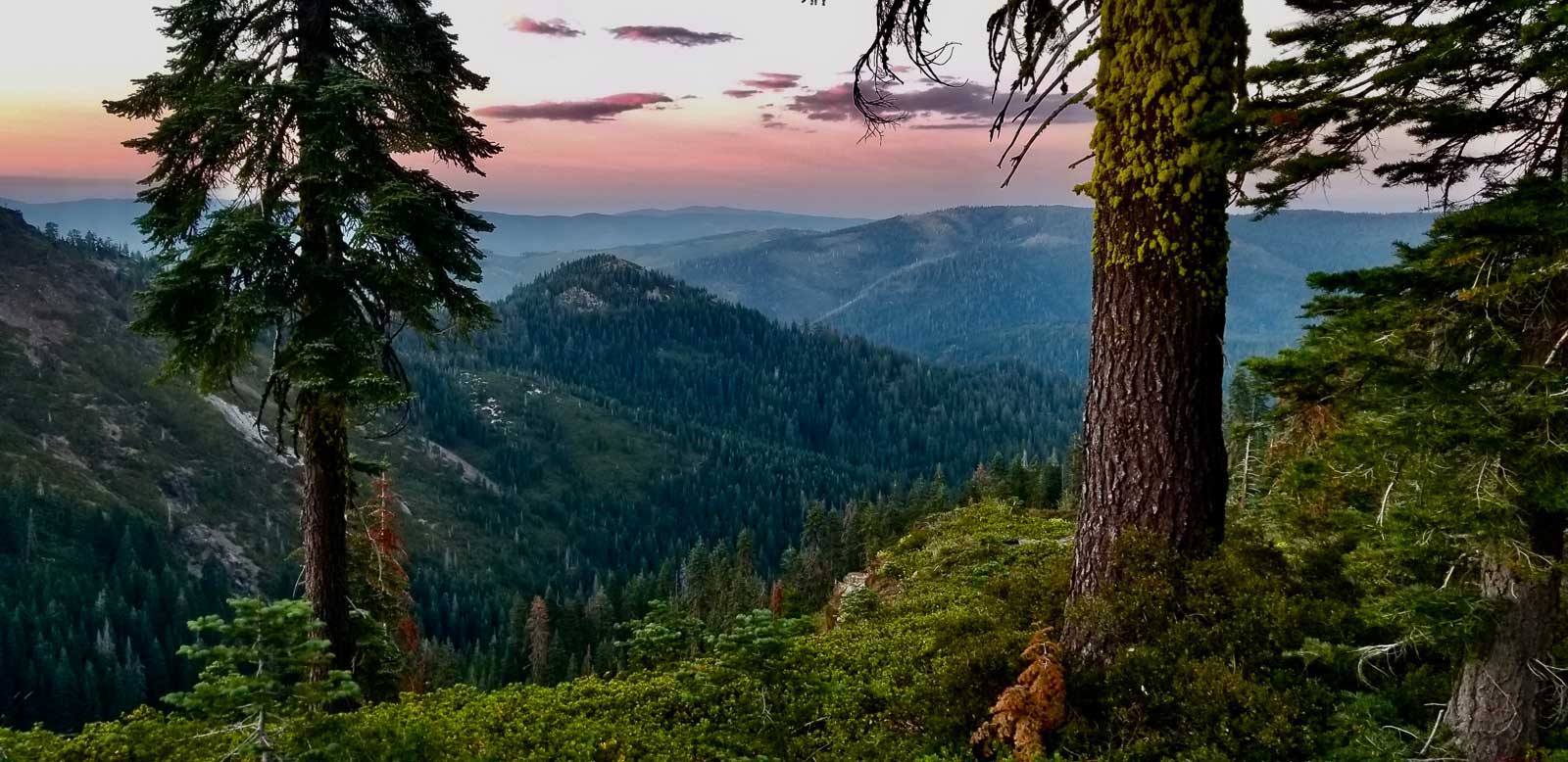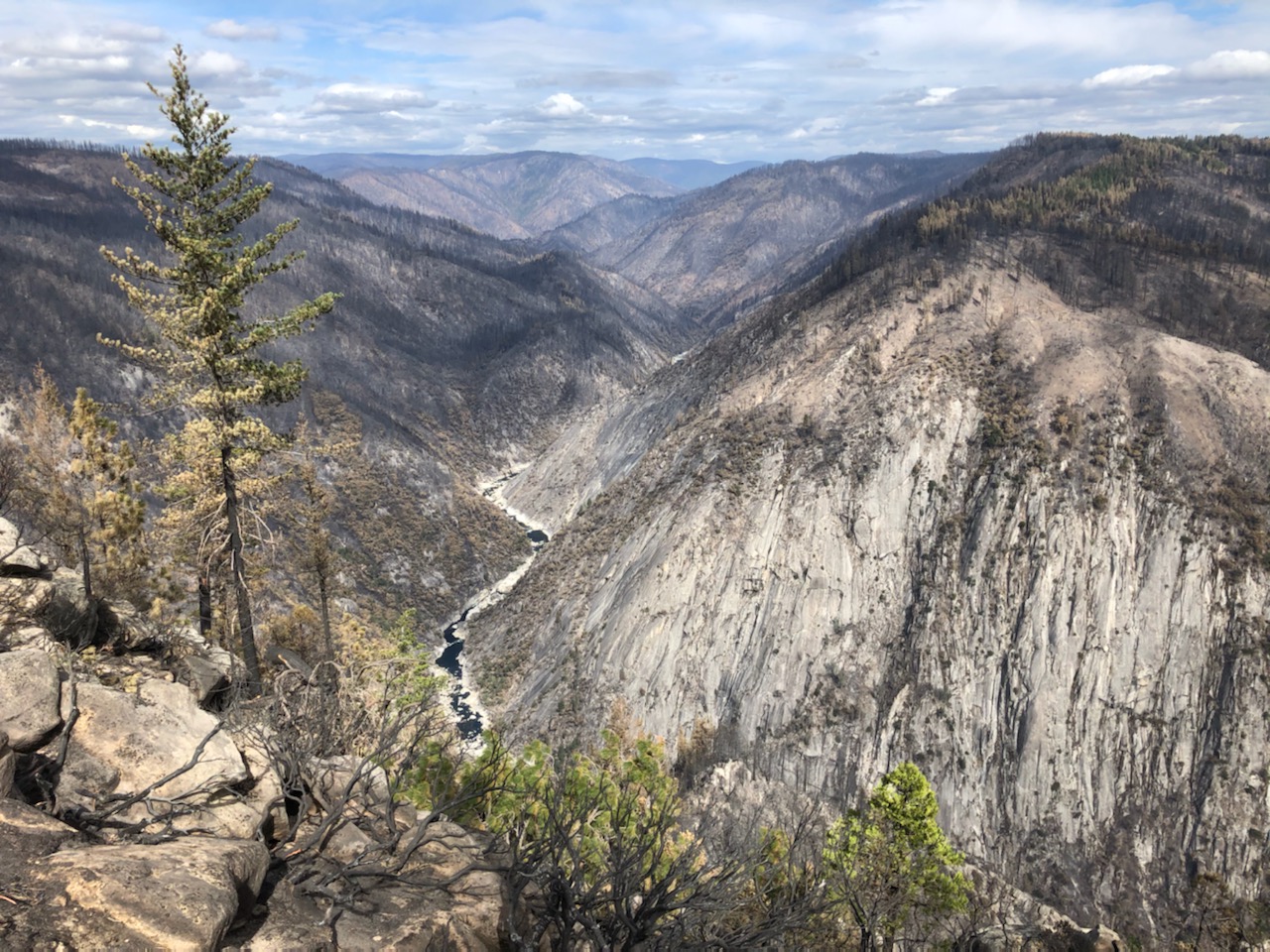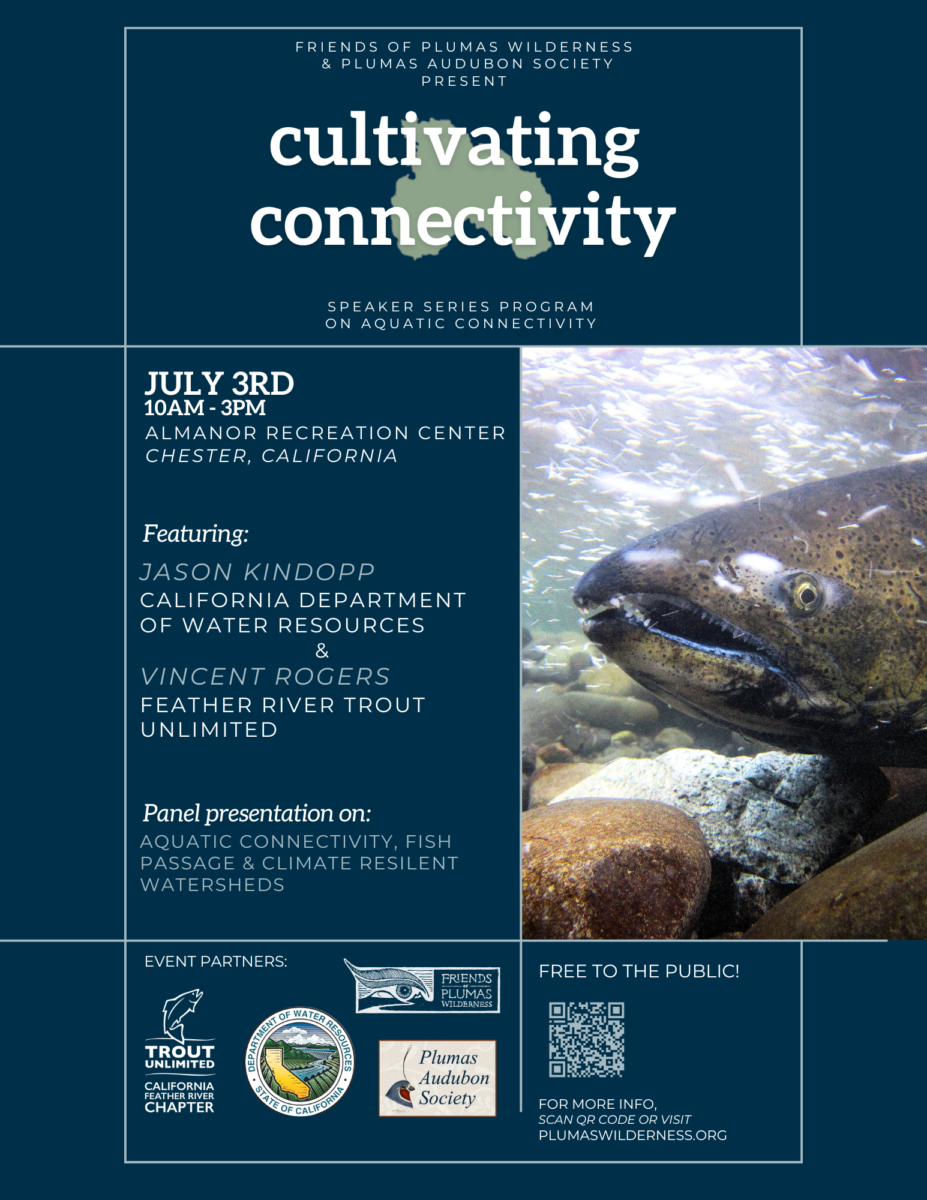


CONNECT WITH US


PRESENTATION INFORMATION:
Ungulate species like deer, elk, and pronghorn play a critical role in the ecological fabric of the Northern Sierra. Their seasonal migrations span vast distances and depend on healthy, connected habitats. Yet increasing habitat fragmentation and climate impacts—like catastrophic wildfire—pose significant challenges to their movement, survival, and population recovery.
This Cultivating Connectivity event brings together perspectives from research and conservation to look at the current state of ungulate populations in the region and approaches to support their recovery. Biologists from the California Department of Fish and Wildlife (CDFW) will share insights on migration routes, population trends, and the science informing habitat conservation for these hooved species.
Speakers will highlight both the challenges and opportunities in supporting the long-term health of ungulate species, and attendees will come away with a deeper understanding of how science, stewardship, and citizen engagement can work together to support wildlife connectivity in the Upper Feather River Watershed.
ABOUT THE SPEAKER:
Dr. Libby Ehlers is an applied ecologist with over two decades of experience applying analytical, collaborative, programmatic, and technological skills to the conservation of endangered species across montane, boreal, marine, and arctic landscapes. As a conservation scientist, Libby brings a lifelong commitment to applying science to understand human impacts on ecosystems and societies in addition to her visceral enthusiasm for conserving diverse landscapes.
Libby is particularly experienced in the use of spatial models to identify critical habitats for larger mammals: for example, to understand predator-prey dynamics for wolf, elk, and bison in Yellowstone National Park or, the effects of industrial development on woodland caribou in the Peace Region of British Columbia. During her PhD (Wildlife Biology, University of Montana), Libby combined observational data with animal locations to test classical ecological theories about the behavior, foraging, and population dynamics of migratory caribou across Alaska and the Yukon. She has integrated applications of animal-borne GPS video collars, drones, and principles of remote sensing into these studies of remote and far-ranging species threatened by rapid climate change. All the while, collaborating with diverse partners for shared outcomes.
Currently, Libby recently started a position as a Senior Environmental Scientist and Wolf Coordinator with the California Department of Fish & Wildlife, leading complex, multi-species conservation efforts and policy coordination across agency and community landscapes. With over two decades of experience working with keystone species (like beaver, caribou, and grizzly bear) and a track record of mitigating human-wildlife conflict both in the field and through research, she’s built a career rooted in integrating science, traditional and Indigenous knowledge, and collaborative leadership.
Libby enjoys collaborating with partners across academic, government, Indigenous and Tribal community and government, NGO, and public sectors to advance science initiatives while contributing her combined strengths and experiences as a hands-on educator, field biologist, program manager, and applied wildlife ecologist. Libby has lived in the Missoula, Montana area with her family and shares her career journeys with her wonderful husband and two children. Libby is currently transitioning to the Northern Sierras. Outside of work, Libby can be found exploring the flora and fauna of the Rocky Mountains with her family, most often interacting with a body of water, in any of its enjoyable states.
PRESENTATION INFORMATION:
Roads and highways can have dramatic effects on wildlife movement and landscape connectivity. Some species may have complete aversion to roads, which would limit their movement through landscapes with roads. Other species may try to cross roads even with traffic present resulting in wildlife mortality and risks to drivers. UC Davis’ Road Ecology Center uses the California Roadkill Observation System (CROS), a volunteer driven citizen science database, to study the impact of roads on wildlife movement at multiple geographic scales, from individual animals at road crossing structures, to hypothetical movement pathways at the landscape scale. Information about where wildlife vehicle collisions occur, what animals are involved, on what roads collisions are frequent, and other data can help inform policy, management, and financial investment in reducing roadkill.
Paul will provide participants with a history of the database, context regarding its relationship to wildlife movement and barriers, as well as provide an overview of the state-wide funding environment in relation to this work. Paul will lead people through the CROS application process and explain the data entry process.
ABOUT THE SPEAKER:
Paul Hardy founded the Feather River Land Trust in 1999, where he served as its Executive Director for 18 years. His 35 years of conservation, land management, and non-profit experience includes working as an avian researcher for the University of Arizona, a wildlife biologist on the Plumas National Forest, co-creating the Sierra Cascade Land Trust Council & Northern Sierra Partnership, and serving on the boards of the California Council of Land Trusts and Plumas Audubon Society.
Paul was born along the Middle Fork Feather River at the Western Pacific Railroad Hospital in Portola. He and his brother, Mark, were lucky to have parents (Richard and Becky Hardy) who took them fishing, hunting, hiking, wildlife watching, and camping throughout the Feather River Watershed and western U.S. After obtaining degrees in wildlife biology from the Universities of California and Arizona, Paul moved back to the Feather River region in 1998 to help start FRLT. Paul currently works as a consulting conservation biologist with Hardy Conservation; however, his primary focus and joy is currently supporting his teenage kids, Emmalyn and Andrew, as they transition into adulthood.
PRESENTATION INFORMATION:
Mari will present on the importance of intact landscapes for healthy ecosystems and discuss ongoing efforts, including research, wildlife crossings, and policy, to connect habitats in the Northern Sierra and beyond.
ABOUT THE SPEAKER:
Mari spent her childhood on a farm in the San Joaquin Valley of California and her summers in the Sierra Nevada, near Ebbetts Pass. Her outdoor exposure inspired her to study ecology, pursuing her bachelor degree in environmental science from Humboldt State University. Recognizing the threats to these ecosystems motivated her to protect them, prompting her to obtain a law degree at the University of Oregon in 2020. Mari has combined her passion for science and policy through working with wildlife and ecology experts to advance innovative legislation and on-the-ground landscape-scale initiatives.
Mari lives in Sacramento, California. When not strategizing a connected California, you’ll find her outside with her dog, Bodie, either backpacking, trail running, sketching, and gardening.
PRESENTATION INFORMATION:
Roads and highways can have dramatic effects on wildlife movement and landscape connectivity. Some species may have complete aversion to roads, which would limit their movement through landscapes with roads. Other species may try to cross roads even with traffic present resulting in wildlife mortality and risks to drivers. UC Davis’ Road Ecology Center uses the California Roadkill Observation System (CROS), a volunteer driven citizen science database, to study the impact of roads on wildlife movement at multiple geographic scales, from individual animals at road crossing structures, to hypothetical movement pathways at the landscape scale. Information about where wildlife vehicle collisions occur, what animals are involved, on what roads collisions are frequent, and other data can help inform policy, management, and financial investment in reducing roadkill.
Paul will provide participants with a history of the database, context regarding its relationship to wildlife movement and barriers, as well as provide an overview of the state-wide funding environment in relation to this work. Paul will lead people through the CROS application process and explain the data entry process. Participants will then be split into up to 3 groups to head out into the field to collect data before returning to the library to review the data and enter it into the CROS.
ABOUT THE SPEAKER:
Paul Hardy founded the Feather River Land Trust in 1999, where he served as its Executive Director for 18 years. His 35 years of conservation, land management, and non-profit experience includes working as an avian researcher for the University of Arizona for 3 years, a wildlife biologist on the Plumas National Forest for 5 years, co-creating the Sierra Land Trust Council and Northern Sierra Partnership, and serving on the boards of the California Council of Land Trusts and Plumas Audubon Society.
Paul was born along the Middle Fork Feather River at the Western Pacific Railroad Hospital in Portola. He and his brother, Mark, were lucky to have parents (Richard and Becky Hardy) who took them fishing, hunting, hiking, wildlife watching, and camping throughout the Feather River Watershed and western U.S. After obtaining degrees in wildlife biology from the Universities of California and Arizona, Paul moved back to the Feather River region in 1998 to help start FRLT. Paul currently works as a consulting conservation biologist with Hardy Conservation; however, his primary focus and joy is currently supporting his teenage kids, Emmalyn and Andrew, as they transition into adulthood.
PRESENTATION INFORMATION:
This panel discussion features California Department of Fish & Wildlife biologists, Jay Lombardi, Arjun Dheer, and Axel Hunnicutt, as well as National Council for Air & Stream Improvement Wildlife Biologist, Katie Moriarty, who specialize in Mountain Lion, Black Bear, Wolf, and Pacific Marten respectively. The moderated panel will delve into newly initiated and ongoing carnivore research efforts in the region.
According to research published by the Royal Society, 64% of large terrestrial carnivores are threatened with extinction, and 80% have declining population trends. Large carnivores have lost 60% of their habitat in the last several centuries.
Carnivores help shape nearly every aspect of an ecosystem, from keeping prey populations balanced, to impacting plant growth and riparian river systems by dispersing herbivores and small carnivores, to reducing animal disease breakouts in ungulates and other animals.
Join biologists from California Department of Fish and Wildlife (CDFW) and the National Council for Air & Stream Improvement (NCASI) to discuss local Black Bear, Mountain Lion, Wolf, and Pacific Marten research projects. During the summer of 2024, field crews will be working throughout Plumas County to collect data that will contribute to the projects shared throughout the presentation.
ABOUT THE SPEAKERS:
Dr. Katie Moriarty is a forest wildlife ecologist. Throughout her career, Katie has studied elusive, forest dependent species such as pollinators, mammals, and birds. She is considered a leading expert on the Pacific marten, a small mammal in the weasel family. She currently works as a senior research scientist with the National Council for Air and Stream Improvement, Inc. (NCASI) where her research focuses on balancing the needs of sensitive wildlife species and biodiversity, with the goal of conservation within managed forest landscapes. Moriarty received Associate degrees from Sierra Community College, a bachelors from Humboldt State University (now Cal Poly Humboldt), and her master’s and PhD from Oregon State University. Dr. Moriarty is active within The Wildlife Society, International Martes Working Group, and the IUCN Small Carnivore Group, working towards small carnivore conservation. Katie currently resides in Corvallis, Oregon with her family.
Axel Hunnicutt is the Statewide Gray Wolf Coordinator for CDFW, where he leads the state’s efforts in gray wolf conservation management, recovery, and research. In addition to general population monitoring, the Gray Wolf Program is currently facilitating several landscape-scale research projects related to 1) wolf spatial ecology and habitat preference, 2) dietary preferences, 3) relationships between wolves and sympatric ungulates, carnivores, and other wildlife species, 4) wolf-livestock depredation patterns across mosaic landscapes, and 5) the effectiveness of CDFW’s non-lethal deterrence tools and compensation programs. Axel is a wildlife ecologist with over a decade of experience working with large carnivores across six countries. Outside of CDFW, Axel serves on the IUCN’s Hyena Specialist Group and is involved in several African-based conservation non-profit organizations.
Dr. Arjun Dheer is the Statewide Black Bear Coordinator for CDFW, leading the Department’s black bear research and conservation efforts. CDFW’s Black Bear Program is undergoing a monumental effort to update its approach to monitoring black bears in California, involving the use of a modernized integrated population model (IPM) to survey bear numbers and vital rates across nine distinct Bear Conservation Regions (BCRs). This work harnesses a collaborative approach to deploy GPS collars on black bears, conduct camera trap surveys, and use intensive local studies to collect data that inform the IPM. Dr. Dheer is an applied ecologist and wildlife manager with a strong international background, having lived and worked in 13 different countries and conducted research on eight large carnivore species. He earned his PhD in Biology from Freie Unveristaet Berlin, in Berlin, Germany, in 2023. In addition, Dr. Dheer is the Red List Authority Coordinator for the IUCN SSC Hyaena Specialist Group, a National Geographic Explorer, and a member of the International Association for Bear Research and Management.
Dr. Jason (Jay) Lombardi is the Statewide Large Carnivore Research Coordinator where he coordinates the Mountain Lion Conservation Program’s research and conservation efforts and assists with internal gray wolf research efforts. The mountain lion conservation program has outlined a multiple year effort to capture and collar mountain lions to help advance our knowledge of 1) connectivity and habitat linkages; 2) landscape genetics and gene flow; 3) human/livestock – lion interactions; and 4) interactions with co-occurring wolves, bears, and deer/elk. Dr. Lombardi is a carnivore landscape and population ecologist by training, having worked with >20 species of carnivores across North America. Outside of CDFW, Dr. Lombardi serves on the International Union for Conservation of Nature’s Species Survival Commission’s Cat Specialist Group.
at the Almanor Parks & Recreation Building
Chester, CA

PRESENTATION INFORMATION:
The final event in the series dedicated to aquatic connectivity and will feature Department of Water Resources’ Environmental Program Manager, Jason Kindopp, and Feather River Trout Unlimited board member, Vincent Rogers. The event will explore research efforts pertaining to the feasibility of salmon reintroduction and climate resilient watersheds in our region. The presentation will be followed by a field tour to the Chester diversion dam to observe the methods being used in the North Fork Feather River Fish Passage Feasibility Study in action.
ABOUT THE SPEAKERS:
Jason Kindopp is an Environmental Program Manager for CA Department of Water Resources where he leads a team of approximately 30 scientists and technicians focused on the research, restoration, and monitoring of Central Valley Chinook salmon, steelhead, and green sturgeon in the Lower Feather River from Oroville Dam to the confluence with the Sacramento River. Jason received his M.S. degree in Biological Sciences from CSU, Chico in 1999 where he studied the intragravel egg survival of Chinook salmon in the lower Feather River. For over 25 years Jason has worked as an Environmental Scientist, Supervisor, and Program Manager, primarily focused on salmon and steelhead research, water operations, and restoration. In addition to river monitoring and research, his team is heavily focused on co-managing the Feather River Fish Hatchery with CDFW for the production, long-term management, and conservation of spring-run Chinook Salmon, fall-run Chinook Salmon, and steelhead. His team is now conducting the feasibility study to understand the potential for reintroducing spring-run Chinook salmon back into the North Fork Feather River above Lake Almanor.
Vince Rogers is an Earth Scientist, fisherman, and a board member with Feather River Trout Unlimited (FRTU). An infrequent visitor throughout his childhood, Vince first came to the Almanor Basin and the Upper Feather River watershed in 2015 as the Basin-Wide Fish Assessment and Community Coordination Fellow, working with Sierra Institute for Community and Environment, FRTU, and the three national forests in the watershed, to develop an assessment and restoration strategy for the Upper Feather River Basin. Working under the scientific tutelage FRTU Board Members Ken Roby, a career USFS Hydrologist who worked on both the Plumas and Lassen National Forests, and Mike Kossow, a Fisheries Biologist whose work focused extensively on the North Fork of the Feather River, both as a California Department of Fish and Wildlife and as a consultant for Pacific Gas & Electric, Vince helped to develop FRTU’s Upper Feather River Basin-Wide Native Fish Restoration & Improvement Strategy, researching current, historic, and projected fisheries distribution and watershed condition to identify climate-change resilient watersheds for FRTU and their partners to focus its restoration and protection efforts. Vince also worked for five years with Feather River Land Trust to protect and steward the natural, cultural and working landscapes of the region. Currently working as a private sector environmental consultant, he now resides in Janesville, California, and is still checking off his bucket list of fishing spots in the Feather River watershed. The rugged lower Middle Fork Feather and its tributaries remain his favorite.